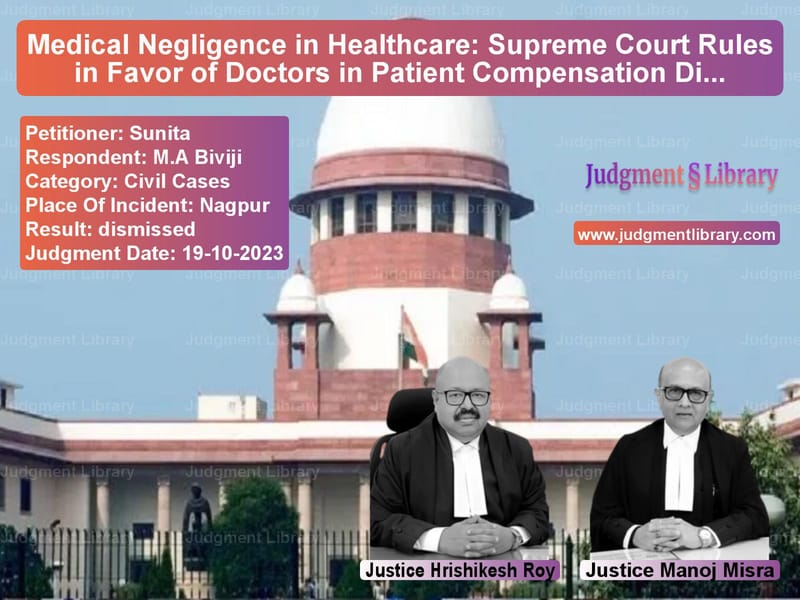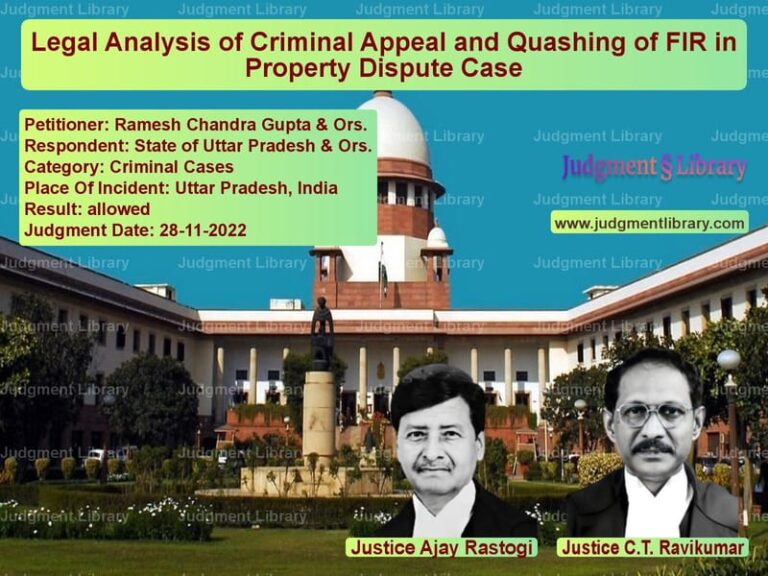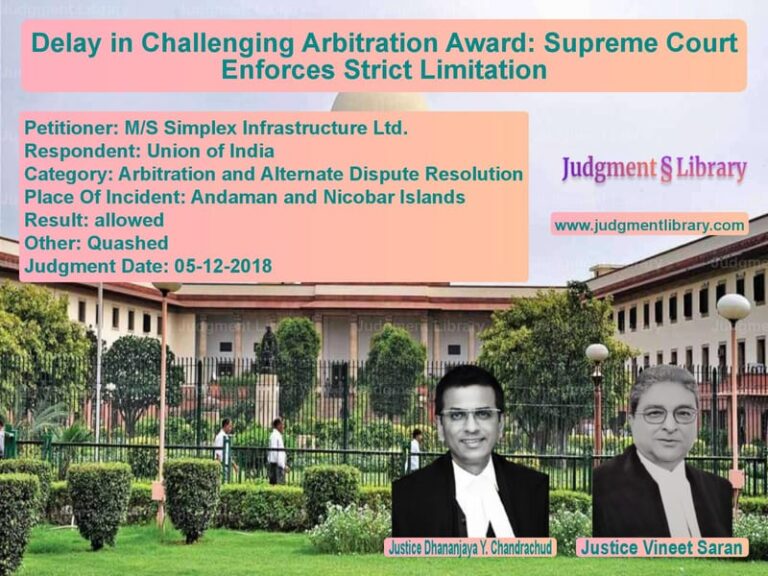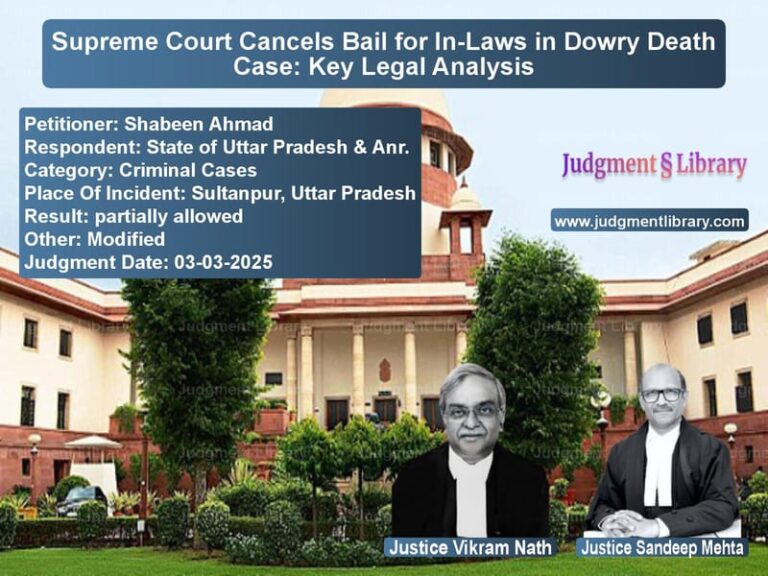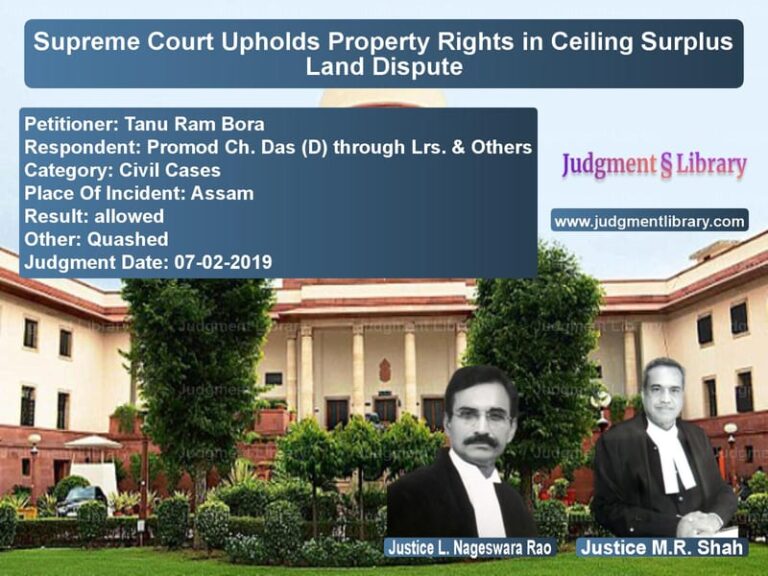Medical Negligence in Healthcare: Supreme Court Rules in Favor of Doctors in Patient Compensation Dispute
The case of M.A Biviji v. Sunita & Ors. is a crucial judgment concerning medical negligence, hospital liability, and patient rights. It arose from a complaint of alleged medical negligence at Suretech Hospital, Nagpur, and has provided significant legal clarity regarding the duties of healthcare professionals and the burden of proof in medical malpractice cases.
In this case, Mrs. Sunita, the complainant, suffered severe medical complications following a Nasotracheal Intubation (NI) procedure that she claimed was unnecessary and led to life-altering conditions such as subglottic stenosis, septicemia, and permanent loss of voice. The National Consumer Disputes Redressal Commission (NCDRC) had ruled in her favor, awarding compensation. However, the Supreme Court ultimately ruled in favor of the doctors, emphasizing the importance of medical judgment and the lack of direct causation between the alleged negligence and the patient’s complications.
Background of the Case
The case dates back to 05.05.2004, when Mrs. Sunita was involved in a severe car accident near Gondia. She sustained multiple fractures, including a mandibular fracture and a clavicle fracture. As part of emergency medical treatment, she underwent a tracheostomy at Gondia Hospital to assist with breathing. She was then transferred to Suretech Hospital in Nagpur, where she was put on a ventilator and later underwent mandibular bracing surgery to stabilize her jaw.
While recovering at Suretech Hospital, a bronchoscopy was conducted on 13.05.2004, which showed a normal airway. Despite this, doctors decided to remove the tracheostomy tube (TT) and replace it with an NI procedure. This, according to the complainant, led to severe medical complications. Food and liquids entered her respiratory tract, leading to severe infections, pus accumulation, and ultimately tracheal stenosis, causing permanent respiratory damage and loss of voice.
Arguments by the Petitioner
Mrs. Sunita filed a complaint before the NCDRC, seeking compensation of Rs. 3,58,85,249/- for the suffering caused by the alleged medical negligence. Her primary arguments were as follows:
- The NI procedure was unnecessary since the bronchoscopy report had shown that her airway was normal, and she was breathing well through the tracheostomy tube.
- The NI procedure led to severe septicemia due to food aspiration into the lungs, causing infection.
- The negligent removal of the Ryle’s Tube (used for feeding) forced her to consume liquids orally, which entered her windpipe due to the inflated cuff of the NI tube.
- The NI procedure resulted in subglottic stenosis, a life-threatening narrowing of the airway, leading to permanent breathing difficulties.
- She lost her ability to speak permanently due to damage to her vocal cords.
- The hospital failed to provide proper post-operative care, worsening her condition.
She argued that the damages awarded by the NCDRC (Rs. 6,11,638/-) were insufficient and demanded an increased compensation with an interest rate of 18% per annum instead of the 9% awarded by the NCDRC.
Arguments by the Respondents
The doctors and Suretech Hospital contested the allegations, asserting that:
- The NI procedure was a medically valid option to aid her breathing and prevent complications.
- The complainant had received treatment at multiple hospitals after leaving Suretech Hospital, making it impossible to directly attribute her complications solely to the NI procedure performed at their hospital.
- Complications such as subglottic stenosis were common in trauma patients who had undergone prolonged intubation.
- The expert committee report from Ram Manohar Lohia (RML) Hospital did not find any medical negligence in the treatment provided at Suretech Hospital.
- Medical professionals are not liable for negligence merely because a different course of treatment might have been chosen by another doctor.
Supreme Court Judgment
The Supreme Court ruled in favor of the doctors and Suretech Hospital. Key observations of the Court included:
- The NI procedure was a recognized medical practice and was undertaken after due consideration.
- There was no evidence proving that the NI procedure was a poor medical decision or that it directly caused the complainant’s long-term complications.
- The complainant failed to provide sufficient evidence to establish a direct causal link between the NI procedure and her subsequent medical conditions.
- Subglottic stenosis and similar complications were common in severe trauma cases, particularly in patients who had undergone multiple intubation procedures.
- The expert medical board did not attribute negligence to Suretech Hospital or its doctors.
The Court emphasized that medical professionals cannot be held liable for negligence merely because their chosen treatment did not yield the desired results. It ruled that the compensation awarded by the NCDRC was unwarranted and set aside the order.
Legal Implications of the Judgment
This case establishes important precedents in medical negligence law:
- For a doctor to be held liable for negligence, there must be clear evidence of a breach of duty and a direct causal link between the alleged negligence and the injury suffered.
- Medical decisions taken in good faith and in line with accepted medical practices cannot be deemed negligent solely based on an adverse outcome.
- Hospitals and doctors are not automatically liable for complications arising from standard medical procedures unless negligence is explicitly proven.
- Patients seeking compensation must provide substantial medical evidence to support their claims.
Conclusion
The Supreme Court’s ruling in M.A Biviji v. Sunita & Ors. underscores the importance of evidence-based litigation in medical negligence cases. While patient rights must be protected, healthcare professionals must also be safeguarded from undue harassment when they exercise reasonable medical judgment. The judgment reinforces that liability in medical negligence cases is contingent upon proving a direct breach of duty, making it a landmark decision in the field of consumer protection law.
Petitioner Name: Sunita.Respondent Name: M.A Biviji.Judgment By: Justice Hrishikesh Roy, Justice Manoj Misra.Place Of Incident: Nagpur.Judgment Date: 19-10-2023.
Don’t miss out on the full details! Download the complete judgment in PDF format below and gain valuable insights instantly!
Download Judgment: sunita-vs-m.a-biviji-supreme-court-of-india-judgment-dated-19-10-2023.pdf
Directly Download Judgment: Directly download this Judgment
See all petitions in Medical Malpractice
See all petitions in Consumer Rights
See all petitions in Damages and Compensation
See all petitions in Judgment by Hrishikesh Roy
See all petitions in Judgment by Manoj Misra
See all petitions in dismissed
See all petitions in supreme court of India judgments October 2023
See all petitions in 2023 judgments
See all posts in Civil Cases Category
See all allowed petitions in Civil Cases Category
See all Dismissed petitions in Civil Cases Category
See all partially allowed petitions in Civil Cases Category

